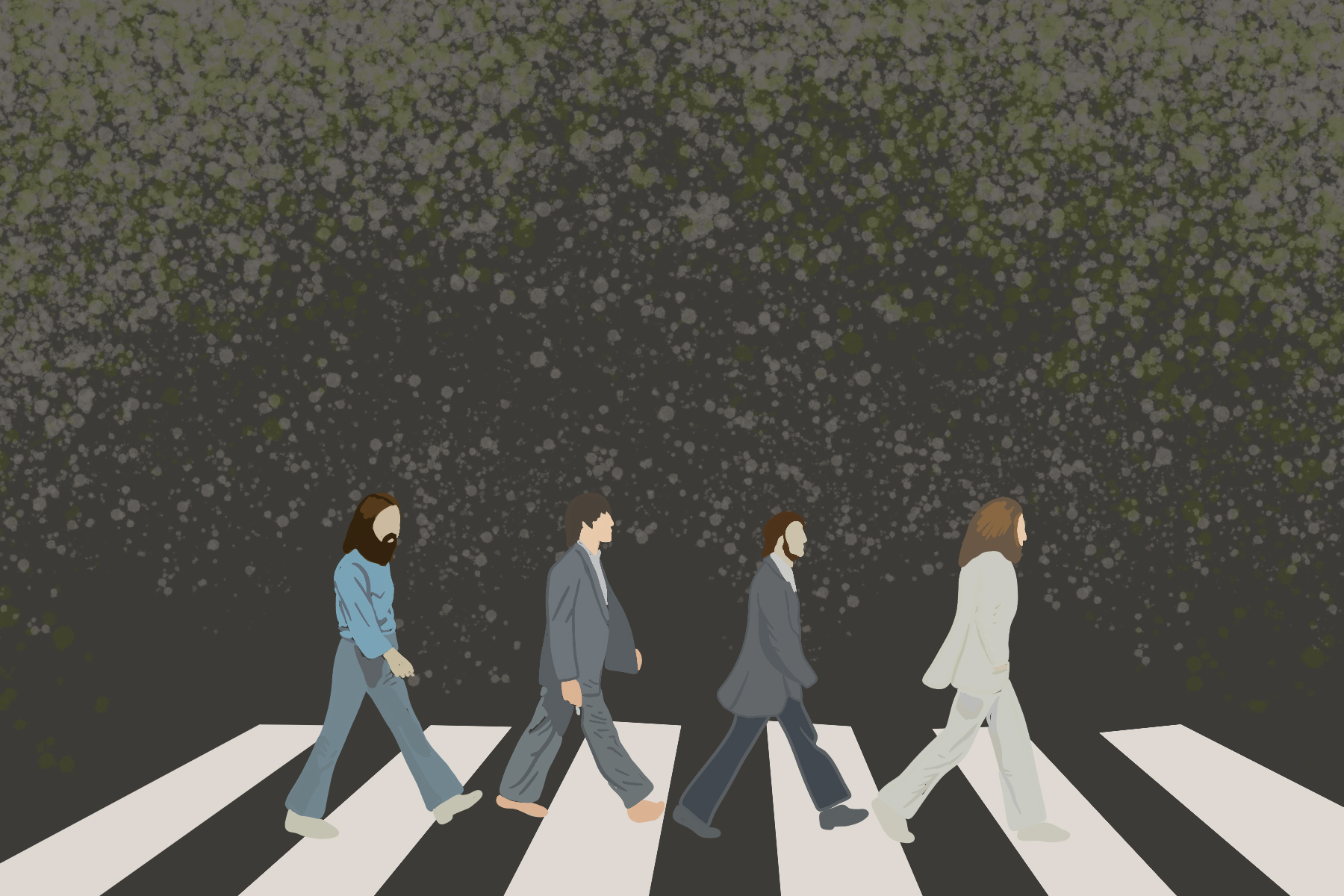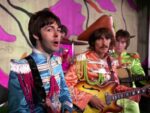News of your birth swept down streets, over hills, across oceans. Like a newborn’s first cry, your first sounds were soaked up by loving ears, cherished by those awaiting your arrival. You were the Beatles’ grand finale, the bang at the end of a decade of triumph. They named you “Abbey Road,” after the street right outside of their recording studio in London. This year you turn 51.
Your masterminds, John Lennon, Paul McCartney, George Harrison and Ringo Starr, rose to fame in the early 1960s, producing countless hits in a steady stream. To the public’s dismay, the four began to disagree and eventually went their separate ways. Their division was evident in your conception. While McCartney and producer George Martin wanted you to be a “series of interconnected songs,” Lennon wanted you to be composed of separate and distinct tracks.
They compromised; your first side became a collection of individual songs and your second, a medley. Regardless of the underlying tension in the group, the four crafted and released you, and the world received you with utter astonishment. You would be their final album recorded — though “Let It Be” was released shortly after — and “Abbey Road” would be one of their greatest.
You start off with a lyrical and rhythmic masterpiece, “Come Together.” The song commences by plunging into a sleek, five-note bassline. Its repetition, supplemented by a hustled patter of drums and Lennon’s electric whisper (“shoot me”), reinforces a potent coolness that suspends over the entire song. The lyrics emerge, sharp and staccatoed, fiery and swaggering, just like the man they describe. This guy is “groovin’ up slowly,” he has “hair down to his knee,” and he “just do what he please.” The slang buttresses Lennon’s ambiance of boldness and freedom.
The drums intensify, becoming less mysterious and more confident, transforming into a heightened heartbeat that anticipates a nearing climax. Lennon tells us, “One thing I can tell you is you’ve got to be free,” before spiraling into a short and compelling chorus. Throughout the piece, the subject is described with an assortment of bizarre terms; he has “joo joo eyeballs,” “toe-jam football” and “walrus gumboot.”
Though these lyrics are a bit ludicrous and difficult to understand, this is exactly their purpose. The song is not meant to be clear and bound by the constructs of common language. It is untamed, idiosyncratic and rebellious. It was quite the exhibition when my docile, nerdy brother performed the song from “Abbey Road” at his fifth-grade talent show.
Next, you present “Something,” a tender love song written by George Harrison. Contrasting with the assertive and unruly style of the preceding track, “Something” takes the form of a gentle hymn in which a man gives himself to a woman entirely. It depicts the power of infatuation to overwhelm and paralyze a lover. The electric guitar, an instrument often used for upbeat riffs in rock songs, instead produces a lovely melody laced with hope, passion and curiosity.
At first, the man is almost submissive to this woman. He is captivated by her incredible beauty, and must say how she makes him feel. As he sings his admiration for her, his lyrics float in a mix of cheerful notes. Suddenly, the scene becomes urgent, as the key changes to minor and the man says he “[doesn’t] want to leave her now,” and repeats. This seems to depict a moment of hesitation.
Soon he returns to his original enamored state, relishing her smile and her style. The key changes again, this time higher, brighter, and the animated orchestra amplifies. He claims he does not know whether his love will grow, but as the music grows, it is clear that his love is doing the same. “Abbey Road,” in this sweet tune, you capture the essence of love, a concept that is difficult to put into words.
Harrison’s striking artistry surfaces again in his song “Here Comes the Sun.” The soft, radiant arpeggio pattern on the guitar is unmistakable, unforgettable, incomparable. It sounds the way that sun rays feel against cold, damp skin. The tune travels through the ears and into the blood, circulating throughout the body and emitting delicious warmth. Harrison’s words soothe the mind as honey does a sore throat. Harrison’s words are equally magical. He is reassuring, he is passionate. He knows “it’s all right.” Harrison produces the exact image of the sun arriving after endless stretches of rain and dark clouds. His song is a reminder to all that no storm lasts forever.
“Abbey Road,” you unveil the Beatles’ inventive storytelling abilities in “Maxwell’s Silver Hammer” and “Octopus’s Garden.” The former, written primarily by Paul, is about a boy, Maxwell, who develops relationships with various people, and ultimately kills each of them with his silver hammer. When asked about the song, Paul described it as an analogy for when something goes wrong out of the blue. He could not explain why the hammer was silver, other than that “it just sounded better than Maxwell’s hammer.”
Ironically, the barbarous plotline is sung placidly over the familiar bounce of a circus tune, the touch of a cymbal on each offbeat inducing a happy tap of the foot. The violent theme manifests in the chorus, in which the words “bang bang,” accompanied by two percussive bangs, launch Maxwell’s fierce assault on his new companions.
“Octopus’s Garden” is a similarly puzzling narrative in which the singer wants to befriend an octopus and live in his home under the sea. Composed primarily of a melodic exchange between Ringo Starr’s buoyant voice and the oscillating glide of an electric guitar, the underwater scene unravels in what feels like an illustrated storybook.
As a painter meticulously encompasses numerous minor details from his subject to create a realistic image, the Beatles subtly detail “Octopus’s Garden” with a nautical piano jingle and even the occasional bubbling sound. Despite the arguably absurd stories developed in these songs, or perhaps because of them, “Maxwell’s Silver Hammer” and “Octopus’s Garden” became some of the best-known and most enjoyed Beatles songs ever made.
Your first side concludes with “Oh! Darling” and “I Want You (She’s So Heavy),” in which the Beatles use their exceptional vocal range and strength to convey desperate and inescapable affection toward another. McCartney pleads as he delivers each “Oh! Darling” to his love interest. He wants her to “please believe [him]”; she must know he’ll “never do [her] no harm.” At this point he sounds as though he is on his knees, in tears. He begs her, “Don’t ever leave me alone.” Soon his voice raises, building with all-consuming rage, and expresses that “when [she] told [him she didn’t] need [him] anymore,” he “nearly broke down and died.” This love has clearly caused emotional damage and exhaustion.
Similarly, in “I Want You (She’s So Heavy),” Lennon reveals feelings of attachment so intense that, after saying “it’s driving me mad,” he releases the scream of a man who has been brutally tortured. The murky bass beneath a thread of minor chords, coupled with an organ’s descending blues riffs, create a sensation of acute heaviness, in accordance with the song title. Each “I want you” is matched by a warping plea produced by the guitar that intensifies with Lennon’s torment.
Your second side includes the brilliant medley McCartney envisioned and championed. Composed of a prelude, three movements and a postlude, the collection is sundry but simultaneously unified with common rhythms and themes. The prelude, “Because,” is a poetic composition that encompasses the roundness of the earth, the wind, love and the sky, in few words. Layers of rich harmony saturate the lyrics with emotion and esoteric meaning, the men reaching a delicate falsetto as they sing about the high wind.
The medley progresses into “You Never Give Me Your Money,” a three-part testament to financial issues, the aftermath of college, and dreams. Opening as an apparently mellow, forlorn piano ballad, the song soon becomes faster-paced and entropic, presumably resembling the mindset of an unemployed college graduate. Finally, the conflicts seem to resolve after “one sweet dream [comes] true,” and the instruments begin yielding bright and optimistic tones.
This triad is followed by “Sun King,” “Mean Mr. Mustard” and ”Polythene Pam,” all of which sound like they could be the products of an improvisation session in which the band sat down and wrote whatever babble came out of their mouths. “Polythene Pam” transitions fluently to “She Came In Through the Bathroom Window,” giving the impression that perhaps Polythene Pam was the unexpected lavatory visitor.
Next is “Golden Slumbers,” a berceuse of strings, piano, bass and a voice that would lull a baby to sleep; then “Carry That Weight,” an impassioned, three-verse tune addressed to a boy who seems to have trouble ahead. “The End,” an epic finale featuring impeccably meshed solos by each member, wraps up the album with a simple but weighty message: “In the end, the love you take is equal to the love you make.”
“Abbey Road,” you were life-changing. You have touched listeners of all circumstances. When you came out in 1969, my dad fell in love; he absorbed every word and savored every note. When he gifted you to my ears three decades later, I experienced the same. Each song, each component of your medley is a bittersweet discovery — how incredible a sound, yet how unlikely it seemed I would ever again feel such enlightenment. Of course, I was, in time, delighted to find that there were plenty more sources of the Beatles’ brilliance. Although you marked the unfortunate end of the Beatles, you carry on the band’s extraordinary legacy by settling into the hearts of millions around the world. Here’s to many more celebrated birthdays.

















Wow, it’s incredible to see how Abbey Road by The Beatles continues to captivate audiences even after 51 years!